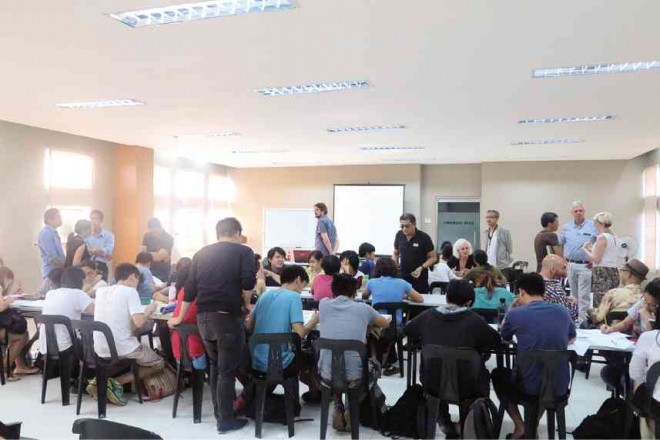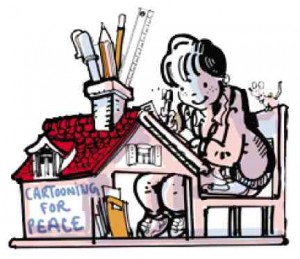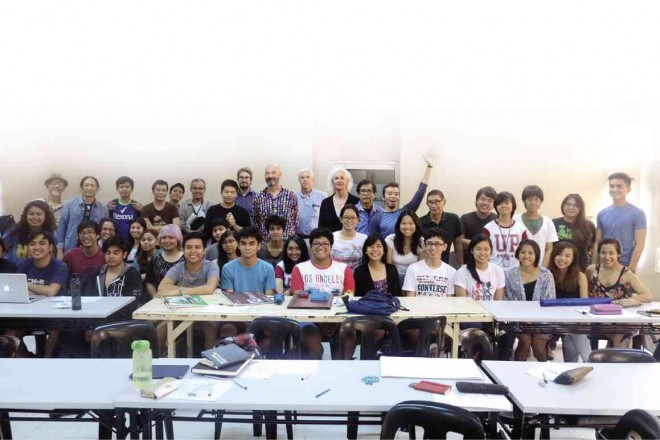Cartoonists draw panels for peace

SCENE from the master class at UP shows the European cartoonists and their Filipino colleagues interacting with the students.

To promote the powerful role that cartoonists can play “in service of peace,” the global network Cartooning for Peace, with the support of the European Union National Institutes for Culture in the Philippines, drew together six European and six Filipino cartoonists to encourage engagement among the cartoonists, the academe, the media and the public.
The European cartoonists were Plantu (Le Monde in France), Philippe Baumann (Vigousse in Switzerland), Bob Katzenelson (freelancer, Denmark), Thomas Plassman and Miriam Wurster (freelancers, Germany).
The Filipino cartoonists were Manix Abrera (Philippine Daily Inquirer), Rene Aranda (Philippine Star), Roni Santiago (Manila Bulletin), Norman Isaac (Tempo), Steven Pabalinas (Manila Times) and Rob Cham (freelancer).
Their packed Manila schedule early this month included cartooning collaborations at the newspaper offices where some of the Filipino cartoonists were affiliated, as well as discussions and master classes at three Manila universities, namely, De La Salle University, University of Santo Tomas (See related stories below.) and University of the Philippines (UP) Diliman.
No to violence
The project’s culminating activities were held on the Diliman campus.
UP professor Helena Rivera-Yu gave a lecture on the history of cartooning in the country. Former College of Mass Communication dean Luis Teodoro discussed the significance of cartooning in the Philippines.
A panel discussion tackled issues such as censorship, humor in cartooning, cultural sensitivity and violence against cartoonists. It brought out the many forms of censorship that cartoonists can face, such as the business interests of privately owned publications, the restrictions imposed on the press under a dictatorship, or even self-censorship, where one is careful to toe the line for the sake of propriety.

THE EUROPEAN and Filipino cartoonists with participants at the UP symposium, workshop and master classes PHOTOS COURTESY OF ALLIANCE FRANCAISE
It was violence against cartoonists, however, that greatly concerned the group.
“Cartoonists are not just going to jail; they are being killed,” said Plantu, who is current president of Cartooning for Peace.
“Everybody is holding on to their pencils and thinking twice. There’s a lot of tension,” said Katzenelson, referring to cartoonists in Europe after the Charlie Hebdo attacks. “Government and society must emphasize that violence is not a means of censorship.”
In addressing issues that may cause religious tension, Plantu said, “When we draw, we are political cartoonists; we are not religious cartoonists … our job is to make cartoons about human rights.”
Abrera sees humor as a way to “engage readers in a healthy discussion” on pertinent issues such as the urban-rural divide, education and poverty. “Most people will laugh first then think about the issue,” he said.
Building bridges
“We’re cartooning to build bridges, to talk, to negotiate, to understand each other towards achieving peace,” Cham said.
A master class followed where UP students were given an hour to draw cartoons to the prompt “envisioning the future of the Philippines.”
The cartoons submitted by the UP fine arts students expressed their hopes and anxieties about Philippine politics and the 2016 elections, as well as reflections on the Filipino identity and the uneasy question about climate change.
“All the hopes for the 2016 elections are in this one picture,” Cham said of a student’s work showing a hand flushing caricatures of a current politician, a crocodile and a pig down a toilet.
Remarking on the first of several cartoons involving crocodiles, Abrera suggested: “Kung may suot na barong yung buwaya mas madaling ma-gets na corrupt politician siya (If you dress the crocodile in a barong, people will get it that he is a corrupt politician).” At that, laughter filled the room.
A collection of dashes depicting the Philippine archipelago sparked discussion among the cartoonists. Lauding the simplicity of the image, Abrera noted the importance of balancing form and content in cartooning and the power of the piece to be open to multiple interpretations.
“I’ve learned that there are different ways of approaching a topic,” Katzenelson said. “This is inspiring for me.”
Plassman encouraged the participants to see cartooning as “a tool in your hand to make the world a little bit better.”
Isaac offered these tips to budding political cartoonists: “Read. Read. Read. See, observe and remember. Try to retain your sense of humor when they say that cartoonists are wearing distorted lenses. Have fun; it’s an enjoyable job.”
Cartooning for Peace chief editor Laure Simoes noted that the activities in Manila were similar to the organization’s successful initiatives in French and Belgian schools that they would want to replicate globally.
It was the organization’s first foray into Asia since its founding in 2006 by former UN Secretary General Kofi Annan and Plantu.
Starting with 12 members, Cartooning for Peace now has 130 cartoonists who continue to march on, armed with pencils and pens, to promote mutual respect between people of different cultures and beliefs through the universal language of cartoons.
Log on to www.cartooningforpeace.org/en.